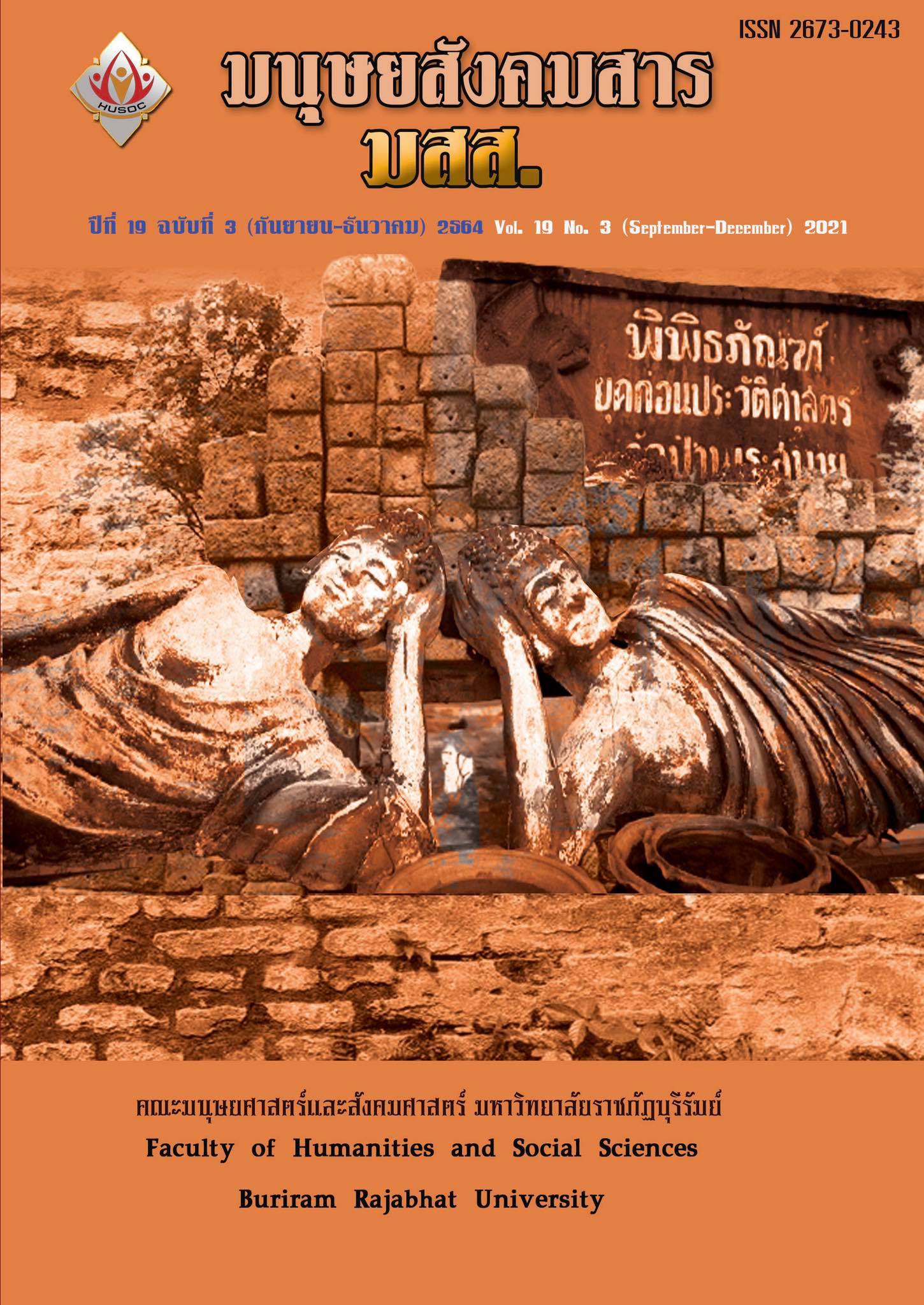การใช้ Google Classroom กับการมีส่วนร่วมในการจัดการเรียนการสอนเพื่อผลสัมฤทธิ์ทางการเรียนรายวิชาการสร้างกราฟิกเวคเตอร์
Main Article Content
บทคัดย่อ
ในการวิจัยครั้งนี้มีวัตถุประสงค์เพื่อ 1) เพื่อศึกษาแนวทางในการจัดการเรียนการสอนผ่าน Google Classroom ในรายวิชากราฟิกเวคเตอร์ คณะมนุษยศาสตร์และสังคมศาสตร์ มหาวิทยาลัยราชภัฏบุรีรัมย์ 2) เพื่อศึกษาถึงผลสัมฤทธิ์ที่ได้จากการเรียนการสอนของผู้เรียนและประโยชน์การใช้เทคโนโลยี ผ่าน Google Classroom ในรายวิชาการสร้างกราฟิกเวคเตอร์ คณะมนุษยศาสตร์และสังคมศาสตร์มหาวิทยาลัยราชภัฏบุรีรัมย์ กลุ่มตัวอย่างได้แก่ นักศึกษาชั้นปีที่ 1 สาขาวิชาศิลปะดิจิทัลจำนวน 34 คน เครื่องมือที่ใช้ ในการวิจัย ได้แก่ 1) ระบบการจัดการเรียนการสอนแบบออนไลน์ด้วย Google Classroom ราย วิชาการสร้างกราฟิกเวคเตอร์ 2) แบบทดสอบเพื่อวัดผลสัมฤทธิ์ทางการเรียนรายวิชาการสร้างกราฟิกเวคเตอร์ สถิติที่ใช้ในการวิเคราะห์ข้อมูลได้แก่ ค่าเฉลี่ย ส่วนเบี่ยงเบนมาตรฐาน ค่าเฉลี่ยร้อยละ และค่าที (t-test) ผลการวิจัยในครั้งนี้พบว่า ผลการหาประสิทธิภาพของสื่อที่ใช้การเรียนการสอนแบบออนไลน์มีค่าความเชื่อมั่นเท่ากับ .90 ซึ่งอยู่มีเกณฑ์ที่มีความเชื่อมั่นสูง ผลสัมฤทธิ์ทางการเรียนของนักศึกษาชั้นปีที่ 1 สาขาวิชาศิลปะดิจิทัลก่อนเรียนและหลังเรียนแตกต่างกันอย่างมีนัยสำคัญทางสถิติที่ระดับ .05 และเมื่อเปรียบเทียบกับนักศึกษาวิทยาลัยชุมชนบุรีรัมย์หน่วยจัดการศึกษาโรงเรียนจันทราวาส (คุรุราษฏร์วิทยา) อำเภอลำปลายมาศ 1 ห้องเรียน จำนวน 40 คนก่อนเรียนและหลังเรียน พบว่ามีความแตกต่างกันอย่างมีนัยสำคัญทางสถิติ ที่ระดับ .05
Article Details

อนุญาตภายใต้เงื่อนไข Creative Commons Attribution-NonCommercial 4.0 International License.
เนื้อหาและข้อมูลในบทความที่ลงตีพิมพ์ในวารสารทดสอบระบบ ThaiJo2 ถือเป็นข้อคิดเห็นและความรับผิดชอบของผู้เขียนบทความโดยตรงซึ่งกองบรรณาธิการวารสาร ไม่จำเป็นต้องเห็นด้วย หรือร่วมรับผิดชอบใดๆ
บทความ ข้อมูล เนื้อหา รูปภาพ ฯลฯ ที่ได้รับการตีพิมพ์ในวารสารทดสอบระบบ ThaiJo2 ถือเป็นลิขสิทธิ์ของวารสารทดสอบระบบ ThaiJo2 หากบุคคลหรือหน่วยงานใดต้องการนำทั้งหมดหรือส่วนหนึ่งส่วนใดไปเผยแพร่ต่อหรือเพื่อกระทำการใดๆ จะต้องได้รับอนุญาตเป็นลายลักอักษรจากวารสารทดสอบระบบ ThaiJo2 ก่อนเท่านั้น
เอกสารอ้างอิง
Jakkaew, P. & Hemrungrote, S. (2017). The use of UTAUT2 model for understanding student perceptions using google classroom: A case study of introduction to information technology course. The international conference on digital arts, media and technology 2017, pp. 11- 17. [in Thai]
Kamel, S. & Wahba, K. (2003). The use of a hybrid model in web-based education: The global campus project. Web-based education: learning from experience, London: Hershey.
Laojaratsaeng, T. (2020). Web based instruction. Retrieved on 6 January 2020 from http://www.kroobannok.com/133 [in Thai]
Malithong, K. (2020). Web based instruction. Retrieved on 5 January 2020 from http://www.kroobannok.com/133 [in Thai]
Ministry of Education. (2001). Basic education curriculum 2001. Bangkok: Wattana Panich. [in Thai]
Nilsuk, P. (2011). Integrated learning management mixed proportions develop educational techniques. Bangkok: King Mongkut's University of Technology North Bangkok. [in Thai]
Prokop, P. (2008). The impact of alternative web-based instructional models on student persistence and achievement in education. Dissertation abstract international, pp. 33.
Ruangrong, P. & Wanchaem, M. (2015). Using google apps to develop teaching Innovations. Phitsanulok: Naresuan University. [in Thai]
Sitthiva, E. & Choothong, W. (2015). Manual for training in using google classroom innovation in teaching of Nakhon Sawan Rajabhat University. Nakhon Sawan: Rajabhat University. [in Thai]
Suttirat, C. (2009). Innovative learner-oriented learning management is important. Bangkok: Danex Inter Corporation. [in Thai]
Thiptharachan, K. & Lertradechakon, T. (2020). Development of guideline for using google apps for education with teaching in the course. Retrieved on 5 January 2020 from http://www.eng. rmutk. ac.th/engweb/dw/KM
Tultham, A. & Jansopa, U. (2016). The satisfaction towards learning management system of moodle and google classroom in teacher role. Mahasarakham: Mahasarakham University. [in Thai]
Wilbur, S. (1969). The mass media as source of public affairs, science and health knowledge. Public opinion quarterly, pp. 197 - 200.
Wiriyaworakul, P. & Ponnak, D. (2014). Google apps for education. Educational innovations in the digital age. Suan Dusit Rajabhat University Research journal, 7(3), pp. 103 - 112. [in Thai]


